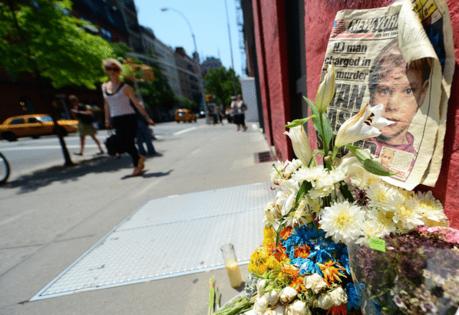Murder conviction in Etan Patz killing overturned, new trial ordered for Pedro Hernandez
Published in News & Features
NEW YORK — The conviction of Pedro Hernandez, the SoHo bodega clerk found guilty in the 1979 kidnapping and murder of 6-year-old Etan Patz, was overturned by a federal appeals court Monday — reopening the book on one of the city’s most notorious slayings.
Hernandez, now 64, is currently serving 25 years to life for the decades-old killing that horrified the city and reverberated around the country. The 2nd Circuit Court of Appeals determined that the judge at Hernandez’s 2017 trial gave improper instructions to the jury, warranting either a new trial or his release from custody.
Emily Tuttle, a spokeswoman for Manhattan District Attorney Alvin Bragg, said, “We are reviewing the decision.”
Little Etan’s cherubic face was one of the first to appear on the side of a milk carton in the 1980s campaign to find missing children. His devastating disappearance in broad daylight 46 years ago is seen as key contributor to a shift to “helicopter parenting” across the U.S. President Ronald Reagan made the anniversary of his disappearance National Missing Children Day in 1982.
The Daily News reached out to Etan’s parents, Stan and Julie Patz, for comment on Monday’s ruling, but they have not yet responded to the decision. They spent decades trying to get justice for their son and advocating for missing children across the country.
Hernandez’s appeal contended that an instruction by the trial court judge in response to a jury note about his alleged confessions improperly ignored Supreme Court precedent. A three-judge panel agreed.
“We conclude that the state trial court contradicted clearly established federal law and that this error was not harmless,” the panel wrote.
After Hernandez’s first trial ended in a mistrial in 2015 when a single holdout refused to convict, Manhattan prosecutors retried the case, leading to his 2017 conviction for felony murder and kidnapping for preying upon little Etan as the child walked alone to his school bus stop for the first time on May 25, 1979.
Authorities first set their sights on Hernandez in 2012, when a tipster called cops alleging he had previously confessed to the crime.
Hernandez, following his arrest, admitted to police that when he was himself a teen, he had lured Etan to the basement of the shop where he worked on West Broadway and Prince St. with a bottle of soda, and choked him. Hernandez claimed he disposed of Etan, still gasping for air, in a plastic bag and a box and left it on a staircase on Thompson St. alley.
The child’s mother discovered he’d never made it as far as the bus stop when he didn’t return home from school. Etan, whose body was never found, wasn’t declared dead until 2001.
The prosecution relied heavily on Hernandez’s confessions at both of his trials, lacking physical evidence and eyewitness testimony.
"Hernandez, who has a documented history of mental illnesses and a low intelligence quotient (‘IQ’), initially confessed after approximately seven hours of unwarned questioning by three police officers. Immediately after Hernandez confessed, the police administered Miranda warnings, began a video recording, and had Hernandez repeat his confession on tape.
"He did so again, several hours later, to an assistant district attorney. At trial, the prosecution discussed and played these videos repeatedly,” Monday’s appeals court described Hernandez’s confessions.
While deliberating, jurors asked the court to explain whether, if they found that Hernandez’s confessions before he was read his Miranda rights were involuntary, they must disregard his post-Miranda confessions.
The judge responded, “No.”
The 2nd Circuit on Monday cited precedent holding unconstitutional the law enforcement tactic of intentionally obtaining an inadmissible confession, administering a Miranda warning, and then having the suspect repeat the confession.
“Despite the jury’s note seeking an ‘expla[nation]’ as to how it was to assess Hernandez’s subsequent statements, the trial court provided none,” the panel wrote.
“Indeed, the answer ‘no’ was manifestly inaccurate, dramatically so.”
Hernandez’s lawyers have long argued that he is profoundly mentally ill and that his confessions under interrogation, which he later recanted, should not have been taken at face value. His attorney, Harvey Fishbein, after the verdict in 2018, remarked, “I hate to say it, but we’re confident we’ll be back here someday.”
“For more than 13 years, Pedro Hernandez has been in prison for a crime he did not commit and based on a conviction that the 2nd Circuit has now made clear was obtained in clear violation of law,” Fishbein said in a statement Monday.
“We are grateful the court has now given Pedro a chance to get his life back, and I call upon the Manhattan district attorney’s office to drop these misguided charges and focus their efforts where they belong: on finding those actually responsible for the disappearance of Etan Patz.”
_____
©2025 New York Daily News. Visit at nydailynews.com. Distributed by Tribune Content Agency, LLC.







Comments